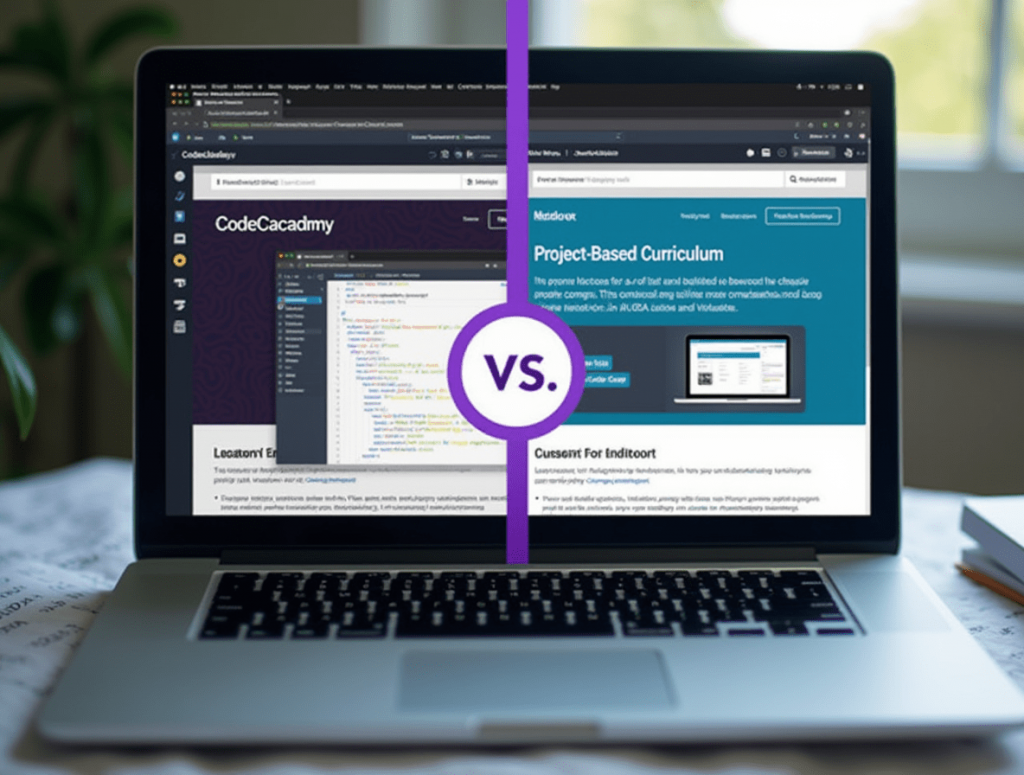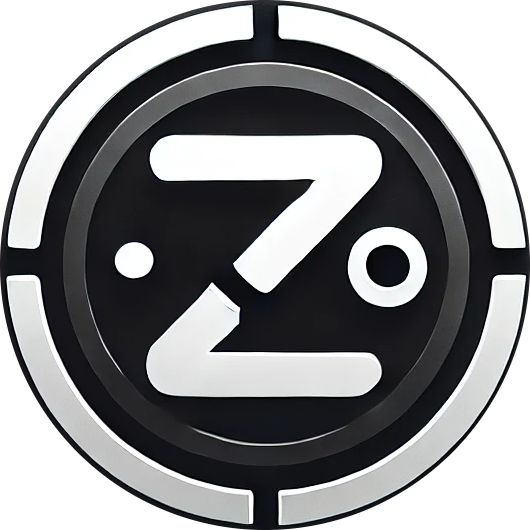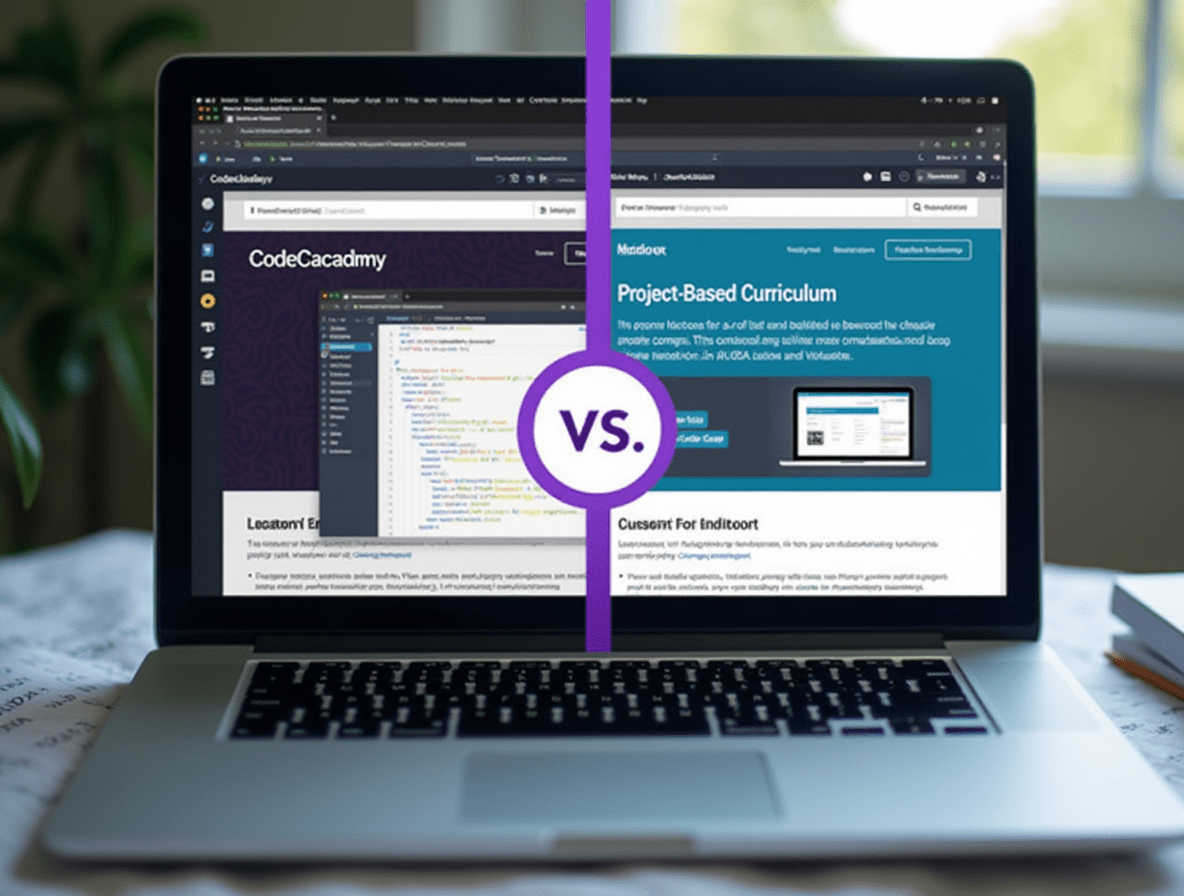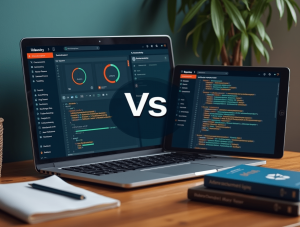
Codecademy vs freeCodeCamp: Which is the Best for Learning Coding?
Did you know that software developer jobs are projected to grow 25% by 2031, much faster than the average for all occupations? Yet for many aspiring programmers, the first significant challenge isn’t landing a job—it’s figuring out where to learn coding skills in the first place.
With countless online coding platforms available, choosing between industry leaders like Codecademy and freeCodeCamp can be overwhelming. Both promise to transform beginners into job-ready developers, but they take remarkably different approaches to education. If you’ve been struggling to decide which platform deserves your time and potentially your money, you’re not alone.
In this comprehensive comparison, we’ll break down exactly how these two popular coding resources stack up against each other across curriculum, learning experience, cost, community support, and career preparation. By the end, you’ll have a clear understanding of which platform aligns best with your learning style, budget, and professional goals.
What Are Codecademy and freeCodeCamp?
Codecademy: The Interactive Learning Environment
Codecademy launched in 2011 as one of the pioneers in interactive coding education. The platform is known for its sleek interface and browser-based coding environment that allows learners to write and execute code directly on the site without installing additional software.
Codecademy operates on a freemium model—offering basic courses for free while keeping more comprehensive content, projects, and certifications behind a subscription paywall with their Codecademy Pro membership.
freeCodeCamp: The Open-Source Nonprofit
In contrast, freeCodeCamp began in 2014 as a completely free, open-source learning platform and nonprofit organization. Founded by Quincy Larson, the platform has grown from a small coding group to a massive global community with millions of learners.
True to its name, freeCodeCamp provides all its content without charge, operating entirely on donations and never requiring payment for any educational resources or certifications.
Curriculum Comparison
Codecademy’s Curriculum
Codecademy shines with its broad range of programming languages and development paths. The platform offers:
- Language Diversity: Courses in Python, JavaScript, Java, Ruby, C++, SQL, PHP, and many more
- Structured Learning Paths: Career-oriented skill paths like “Full-Stack Engineer” or “Data Scientist”
- Interactive Lessons: Bite-sized lessons with immediate feedback and validation
- Project-Based Learning: Real-world projects (primarily in the Pro tier)
The platform’s curriculum is carefully designed to build skills progressively, with each concept building upon previous lessons in a logical sequence.
freeCodeCamp’s Curriculum
freeCodeCamp takes a more focused approach with its curriculum:
- Comprehensive Certifications: Six major certifications requiring 300+ hours each
- Web Development Focus: Strong emphasis on JavaScript and web technologies
- Project-Heavy Learning: Five required projects for each certification
- Algorithm Challenges: Extensive problem-solving challenges
- Open Source Contribution: Encouragement to contribute to real open-source projects
freeCodeCamp’s curriculum is more web development-centric, though they’ve expanded to include data analysis, machine learning, and other specialized areas in recent years.
Learning Experience
The Codecademy Experience
Codecademy provides an extraordinarily polished learning environment with:
- Integrated Code Editor: Write, execute, and test code directly in your browser
- Step-by-Step Guidance: Clear instructions and hints when you get stuck
- Visual Learning: Illustrations and diagrams to explain complex concepts
- Instant Feedback: Immediate validation of code correctness
- Progress Tracking: Visual indicators of your advancement through courses
The platform excels at creating a frictionless experience that helps beginners avoid early frustrations with development environment setup.
The freeCodeCamp Experience
freeCodeCamp offers a more challenging but potentially more authentic learning journey:
- Real-World Development: Encourages using professional development tools
- Community Forums: Active discussion and help from peers
- Comprehensive Projects: Complete applications rather than small exercises
- External Resources: Integration with YouTube videos and articles
- Deep Dives: Thorough exploration of fundamental concepts
freeCodeCamp deliberately pushes students toward independence earlier, creating both greater challenge and potentially deeper learning.
Cost Comparison
Codecademy’s Pricing Structure
Codecademy operates on a freemium model:
- Free Tier: Basic interactive courses with limited access
- Codecademy Pro: $19.99/month (billed annually) or $39.99/month (billed monthly)
- Pro Student: Discounted rate of $149.99/year for eligible students
- Team Plans: Enterprise options for businesses and organizations
The Pro subscription unlocks projects, career paths, certificates, and peer community access.
freeCodeCamp’s Pricing Structure
freeCodeCamp’s pricing is refreshingly straightforward:
- 100% Free: All content, certifications, and community access
- Donation-Based: Supported by optional donations and grants
- No Premium Tier: No feature restrictions or paywalls of any kind
- Open Source: All curriculum materials are publicly available on GitHub
This commitment to free education is core to freeCodeCamp’s mission of making coding accessible to everyone regardless of financial circumstances.
Community and Support
Codecademy’s Community
Codecademy has evolved its community features, especially for Pro members:
- Pro Community: Forums and chat for subscribers
- Peer Code Reviews: Feedback on projects from other learners
- Codecademy Chapters: Local meetups in some cities
- Moderated Support: Staff assistance for technical issues
The community experience varies significantly between free and paid tiers, with most robust support reserved for Pro members.
freeCodeCamp’s Community
Community is perhaps freeCodeCamp’s greatest strength:
- Massive Forum: Over 1.5 million members discussing code and careers
- Local Study Groups: Volunteer-led meetups worldwide
- Discord Server: Active chat channels for immediate help
- Publication: One of the largest tech blogs with community-contributed articles
- YouTube Channel: Thousands of hours of in-depth tutorials
The sheer scale and activity level of freeCodeCamp’s community creates an ecosystem that extends far beyond the curriculum itself.
Career Preparation and Job Placement
Codecademy’s Career Resources
Codecademy Pro includes several career-focused features:
- Interview Prep: Technical interview practice
- Portfolio Projects: Guided projects suitable for portfolios
- Career Paths: Structured learning toward specific roles
- Certificates: Course completion certificates
- Resume Building: Limited guidance on showcasing skills
While helpful, Codecademy doesn’t offer formal job placement or guarantee employment outcomes.
freeCodeCamp’s Career Resources
freeCodeCamp approaches career preparation differently:
- Verified Certifications: Rigorous project-based certifications
- Job Board: Free developer job listings
- Alumni Network: Successful graduates active in the community
- Open Source Contributions: Real-world collaboration experience
- Career Advice Publication: Extensive articles on job searching
The emphasis is on building demonstrable skills through substantial projects rather than formal job placement services.
Who Should Choose Each Platform?
Codecademy Is Best For:
- Complete Beginners: Those who benefit from structured, guided learning
- Visual Learners: People who appreciate slick interfaces and interactive elements
- Career Changers with Budgets: Professionals willing to invest in a polished learning experience
- Those Exploring Multiple Languages: Learners wanting to sample various programming languages
- Structure-Oriented Learners: People who prefer clear pathways and incremental progress
freeCodeCamp Is Best For:
- Self-Directed Learners: Those comfortable with figuring things out independently
- Budget-Conscious Students: Anyone unable or unwilling to pay for learning resources
- Web Development Focused: People specifically targeting web development careers
- Community-Oriented Learners: Those who thrive in active community environments
- Project Portfolio Builders: Coders wanting substantial projects for their portfolios
The Verdict: Making Your Choice
Both Codecademy and freeCodeCamp have produced successful developers, but they serve different learning styles and circumstances.
Choose Codecademy if:
- You learn best with structured guidance and immediate feedback
- You’re willing to pay for a more polished learning experience
- You want to explore multiple programming languages
- You prefer smaller, incremental learning steps
Choose freeCodeCamp if:
- You’re on a tight budget but committed to learning
- You specifically want to become a web developer
- You thrive in community environments
- You learn best through challenging projects
- You value the discipline of deeper, more independent learning
Many successful developers actually use both platforms—starting with Codecademy’s friendly introduction to coding concepts before transitioning to freeCodeCamp’s more rigorous project-based curriculum.
Remember that consistency matters more than platform choice. The best coding education is the one you’ll actually complete.
Conclusion
Both Codecademy and freeCodeCamp offer valuable pathways into the world of programming, but they serve different learning styles and circumstances. Codecademy provides a polished, guided experience ideal for beginners willing to invest financially in their education. freeCodeCamp offers a more challenging but entirely free curriculum with an unmatched community and project-based approach.
Rather than declaring one platform superior, consider how each aligns with your personal learning style, budget constraints, and specific career goals. Many successful developers have utilized both platforms at different stages of their learning journey.
Whatever you choose, remember that consistent practice and project building will ultimately determine your success more than any specific learning platform.
FAQ Section
Q: How long does it take to complete Codecademy vs. freeCodeCamp curricula?
A: Codecademy’s individual courses can be completed in weeks, while career tracks may take 3-6 months of consistent effort. freeCodeCamp’s certifications require roughly 300 hours each, with many learners taking 6-12 months to complete multiple certifications.
Q: Do employers recognize certifications from these platforms?
A: While neither certification carries the weight of a computer science degree, employers value the skills demonstrated through projects. freeCodeCamp certifications typically require more substantial projects that can better demonstrate job-readiness.
Q: Can I switch between platforms if I start with one?
A: Absolutely. Many developers use Codecademy to learn syntax and basic concepts, then move to freeCodeCamp for more rigorous project work. The skills are transferable, though you may encounter some repetition of fundamentals.
Q: Which platform is better for learning Python specifically?
A: Codecademy offers more comprehensive Python-specific tracks with interactive exercises. While freeCodeCamp has added Python certifications, their JavaScript and web development content remains more extensive.
Q: Do I need prior programming experience for either platform?
A: Both platforms welcome complete beginners. Codecademy may feel more accessible initially due to its incremental approach, while freeCodeCamp sometimes requires more independent problem-solving that can challenge true beginners.














